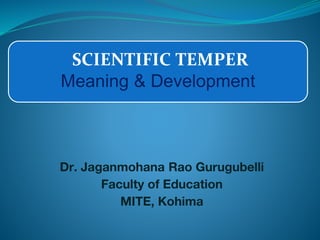
3 scientific temper meaning and nature
- 1. SCIENTIFIC TEMPER Meaning & Development Dr. Jaganmohana Rao Gurugubelli Faculty of Education MITE, Kohima
- 2. Concept of Scientific Temper The major aim of science education is to develop scientific attitude among the learners in proper way. Let us first look at the two terms mentioned here- ‘Scientific Attitude’ and ‘Scientific Temper’. These terms are used interchangeably in field of science and encompass similar traits or features that are required to be developed among learners through science teaching. Attitudes can be defined as ‘mental predispositions toward people, objects, subjects, events, and so on.
- 3. Importance of Scientific Attitude The term “Scientific Temper” was very prominently articulated by Pandit Jawaharlal Nehru in his famous book Discovery of India (1946). In this book, Nehru stated that “The scientific approach and temper are, or should be, a way of life, a process of thinking, a method of acting and associating with our fellowmen”. He further explained that the “scientific approach as the adventurous and yet critical temper of science, the search for truth and new knowledge, the refusal to accept anything without testing and trial, the capacity to change previous conclusions in the face of new evidence, the reliance on observed fact and not on pre-conceived theory, the hard discipline of the mind — all this is necessary, not merely for the application of science but for life itself and the solution of its many problems.
- 4. Attributes of Scientific Temper Scientific Temper Perseverance Critical Thinking Logical Thinking Respect for Evidence Objectivity Open Mindedness Honesty in Reporting Scepticism
- 5. Critical thinking It is the ability to analyze our experiences and review our actions through reflecting on them. It requires an abstract thinking to reflect on our actions. We use critical thinking to evaluate whether something is adequate, correct, useful or desirable. You can nurture critical thinking among your learners by encouraging them to review their work for further improvement. You should discuss with them about the failures or mistakes in previous work. Also, discuss the alternate ways of approaching a given problem if one doesn’t seem working.
- 6. Logical thinking It requires thinking with logical reasoning. Logical thinking is the essence of having scientific temper as it makes you focus on your observations and organize them carefully through reasoning before arriving at any conclusion. You should give enough opportunities to your learners to reason out their observations. Learners start looking for patterns in terms of cause and effects before concluding once they start developing logical thinking.
- 7. Respect for evidence Any judgment or conclusion in science should be based on suitable evidences. In case, there are not enough evidences to support a conclusion, it cannot be treated as valid scientific idea. Similarly, if there are evidences contradicting some idea, then there should be willingness to change the idea itself in the light of convincing evidences. You should help learners to collect evidences for verifying and testing their ideas about any object or event and adequately help them learn how to confront ideas with evidences.
- 8. Objectivity This is referred to the ability of looking at things without preconceived notions, prejudices or subjective biases. Objectivity will also help in developing respect for evidences, since an objective person will only rely on unbiased evidences. If somebody sets for a scientific enquiry with some preconceived notions in mind then there are obvious chances to obtain biased results. It is better if you help your learners learn to accept any idea only after testing and verifying it against sufficient number of evidences.
- 9. Open-mindedness Scientific temper demands that the person should be open-minded and flexible in her/his approach. The person is required to evaluate all observations, inferences and explanations carefully; and then accept the ones which are consistent with the evidences and offers best possible explanation of the phenomenon. You can help your learners to become open-minded by letting them share their viewpoints with each other and evaluate them collectively. They should be helped to show respect for best explanations and review their own conclusions if found inconsistent with the upcoming observations/evidences.
- 10. Honesty in reporting observations As a science teacher to imbibe the habit of carrying out a science experiment honestly and report the actual results. Focus should be more on processes rather than the results of inquiry . Deviations or discrepancies in the results are obvious but learners should not be penalized for it. Rather, you should help them think of the possible reasons for deviations in results obtained.
- 11. Scepticism It is the ability to question accepted beliefs, ideas or facts prevalent in society on the basis of scientific reasoning or investigations. You should help your learners to develop this attitude of questioning widely accepted superstitions and myths in our society in the name of religion, culture, magic and so on. It is better if you give lot of space in your science classes about discussing such non-scientific ideas and beliefs to help learners develop into logical and rational thinker.
- 12. Perseverance It is the ability to carry out something with sustained and persistent efforts. History makes it evident that lots of scientific inventions were the results of persistent efforts of scientists and for some it took their lifetime even. You must help your learners to accept their failures, learn from them and motivate for further trials.
- 13. Conclusion You must have understood that developing scientifically is basically acquiring positive scientific attitudes. Since, attitudes influence the way people respond to anything, therefore a child with a positive scientific attitude will perceive science objects, content, activities, people, etc. positively. You cannot expect your learners to develop these qualities overnight. The scientific attitude is nurtured over a period of time resulting through a consistent engagement with relevant learning activities; like performing various experiments, asking questions, reading scientific literature, and making science learning more inquiry oriented.
- 14. THANK YOU
